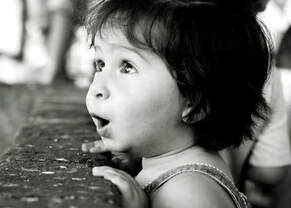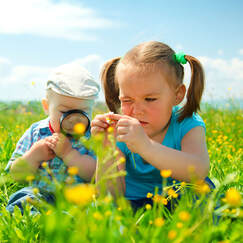april: Curiosity and wonder

God created us with curious minds. Educators are well aware that sparking curiosity leads to greater learning, but too often in the church we stifle curiosity. It can scare us - what if curiosity leads to questions without answers? What if curiosity leads to discoveries we’re unprepared to handle? Good news - a little mystery never hurt anyone, and none of us have to have all the answers! As one of my seminary profs said, “Suspend judgement and exercise curiosity.” This is a fantastic way to let our faith develop, and kids are great at leading us in it. So follow your child’s curiosity. Mirror and encourage their awe and wonder. As this proverb urges, “get insight.” Let that curiosity lead to greater understanding - and greater curiosity.
Read It Proverbs 4: 5-9
Get wisdom; get understanding .......
Get wisdom; get understanding .......
Pray It
God, your world is full of things we don’t understand. Thank you for giving us curiosity so we can try to understand it better. Amen.
God, your world is full of things we don’t understand. Thank you for giving us curiosity so we can try to understand it better. Amen.

Do It
Wonder Walk: Go on a walk together and practice curiosity. Model it by your own wondering - “I wonder how many different kinds of things are growing on the ground right here?” Follow that curiosity when you can (get down on the ground and count the different ground covers in two square feet, then maybe look up what they are (on iNaturalist or a similar app). Throw in a few thank you prayers - “Thank you God for squill!” (Curious about what squill is? Look it up.)
Wonder Reading: Ask “wondering questions” as you read the Bible together. The Shine On story Bible from MennoMedia offers wondering questions with every story, and can help you get started. Let that wondering lead you to greater understanding, or just let it be a question.
Part of what you’re doing is modeling a faith that seeks understanding
but doesn’t always require answers.
Wonder Walk: Go on a walk together and practice curiosity. Model it by your own wondering - “I wonder how many different kinds of things are growing on the ground right here?” Follow that curiosity when you can (get down on the ground and count the different ground covers in two square feet, then maybe look up what they are (on iNaturalist or a similar app). Throw in a few thank you prayers - “Thank you God for squill!” (Curious about what squill is? Look it up.)
Wonder Reading: Ask “wondering questions” as you read the Bible together. The Shine On story Bible from MennoMedia offers wondering questions with every story, and can help you get started. Let that wondering lead you to greater understanding, or just let it be a question.
Part of what you’re doing is modeling a faith that seeks understanding
but doesn’t always require answers.
Explore it: A Note from Tami
Don't be surprised if a byproduct of nurturing your child's curiosity is that you become more curious and tuned into wonder yourself! Following are several resource you might find helpful.
A book: Wondering about the Bible: Engaging a child's curiosity about the Bible by Betty Caldwell. "How we read and interpret the Bible with children may mean the difference between whether or not it will continue to be an important source for their faith development as they become young adults. We want to teach them in ways that they don’t have to unlearn later."
Fostering a Sense of Wonder and Joy in Children
One of the most delightful things about children is their sense of innocence and wonder, yet helping them maintain that sense of wonder can be challenging in our sophisticated, hurried society. Fortunately, cultivating childhood wonder and joy doesn’t require monumental effort, but rather, doing less of what doesn’t matter and more of what does. Quick, simple activities can make a big difference. In this article, we offer a few ideas for creating a wonder-filled home.
Ages and Stages: How Curiosity Leads to Learning
This article helps us understand children's curiosity at different ages.
Rocking and Rolling: Fostering Curiosity in Infants and Toddlers
How does a child show curiosity before she can talk? How do we tune into and foster that curiosity?
Don't be surprised if a byproduct of nurturing your child's curiosity is that you become more curious and tuned into wonder yourself! Following are several resource you might find helpful.
A book: Wondering about the Bible: Engaging a child's curiosity about the Bible by Betty Caldwell. "How we read and interpret the Bible with children may mean the difference between whether or not it will continue to be an important source for their faith development as they become young adults. We want to teach them in ways that they don’t have to unlearn later."
Fostering a Sense of Wonder and Joy in Children
One of the most delightful things about children is their sense of innocence and wonder, yet helping them maintain that sense of wonder can be challenging in our sophisticated, hurried society. Fortunately, cultivating childhood wonder and joy doesn’t require monumental effort, but rather, doing less of what doesn’t matter and more of what does. Quick, simple activities can make a big difference. In this article, we offer a few ideas for creating a wonder-filled home.
Ages and Stages: How Curiosity Leads to Learning
This article helps us understand children's curiosity at different ages.
Rocking and Rolling: Fostering Curiosity in Infants and Toddlers
How does a child show curiosity before she can talk? How do we tune into and foster that curiosity?

